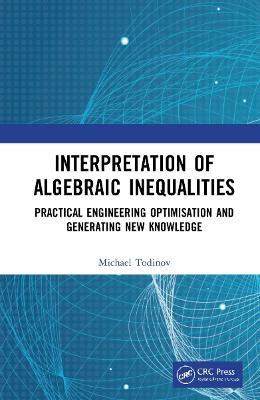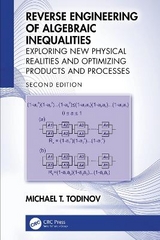
Interpretation of Algebraic Inequalities
CRC Press (Verlag)
978-1-032-05917-4 (ISBN)
This book introduces a new method based on algebraic inequalities for optimising engineering systems and processes, with applications in mechanical engineering, materials science, electrical engineering, reliability engineering, risk management and operational research.
This book shows that the application potential of algebraic inequalities in engineering and technology is far-reaching and certainly not restricted to specifying design constraints. Algebraic inequalities can handle deep uncertainty associated with design variables and control parameters. With the method presented in this book, powerful new knowledge about systems and processes can be generated through meaningful interpretation of algebraic inequalities. This book demonstrates how the generated knowledge can be put into practice through covering the algebraic inequalities suitable for interpretation in different contexts and describing how to apply this knowledge to enhance system and process performance. Depending on the specific interpretation, knowledge, applicable to different systems from different application domains, can be generated from the same algebraic inequality. Furthermore, an important class of algebraic inequalities has been introduced that can be used for optimising systems and processes in any area of science and technology provided that the variables and the separate terms of the inequalities are additive quantities.
With the presented various examples and solutions, this book will be of interest to engineers, students and researchers in the field of optimisation, engineering design, reliability engineering, risk management and operational research.
Professor Michael Todinov works on mechanical engineering, applied mathematics and computer science. After receiving a DEng from the University of Birmingham, he built a reputation working on reliability and risk, flow networks, probability and probabilistic fatigue and fracture. He is Professor of Mechanical Engineering at Oxford Brookes University, UK.
Chapter 1 Fundamental Approaches in Modelling Real Systems and Processes by Using Algebraic Inequalities. The Principle of Non-contradiction for Algebraic Inequalities
Chapter 2 Basic Algebraic Inequalities
Chapter 3 Generating Knowledge about Physical Systems by Meaningful Interpretation of Algebraic Inequalities
Chapter 4 Enhancing Systems Performance by Interpretation of the Bergstrom Inequality
Chapter 5 Enhancing Systems Performance by Interpretation of Other Algebraic Inequalities Based on Sub-Additive and Super-Additive Functions
Chapter 6 Optimal Selection and Expected Time of Unsatisfied Demand by Meaningful Interpretation of Algebraic Inequalities
Chapter 7 Enhancing Decision-Making by Interpretation of Algebraic Inequalities
Chapter 8 Generating New Knowledge by Interpreting Algebraic Inequalities in Terms of Potential Energy
| Erscheinungsdatum | 15.10.2021 |
|---|---|
| Zusatzinfo | 29 Line drawings, black and white; 29 Illustrations, black and white |
| Verlagsort | London |
| Sprache | englisch |
| Maße | 152 x 229 mm |
| Gewicht | 335 g |
| Themenwelt | Mathematik / Informatik ► Informatik ► Theorie / Studium |
| Mathematik / Informatik ► Mathematik ► Angewandte Mathematik | |
| Technik ► Maschinenbau | |
| Technik ► Umwelttechnik / Biotechnologie | |
| ISBN-10 | 1-032-05917-6 / 1032059176 |
| ISBN-13 | 978-1-032-05917-4 / 9781032059174 |
| Zustand | Neuware |
| Haben Sie eine Frage zum Produkt? |
aus dem Bereich



